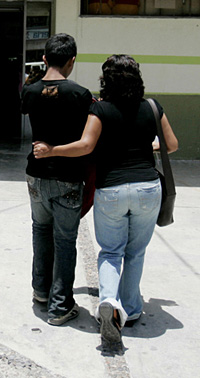 |
 |
 |
 Editorials | Issues | September 2007 Editorials | Issues | September 2007  
‘A Terrible Situation’
 Andres R. Martinez & Jeremy Roebuck - The Monitor Andres R. Martinez & Jeremy Roebuck - The Monitor
go to original


| | Oscar Enrique Perez, 12, and his mother Josefina Perez Bravo walk into the bus station in Reynosa to return to Cuernavaca, Mexico. The two were temporarily separated after being caught while crossing illegally en route to Houston to work. (Kirsten Luce/kluce@themonitor.com) |
Reynosa — Clutching a clear plastic bag with all his worldly possessions, 12-year-old Oscar Enriquez Laguna Perez returned to Mexico worried he would never see his family again. (Watch "Enrique's Repatriation," a Monitor multimedia presentation.)

But seconds after Mexican consular officials dropped him off on a dusty, unpaved side street last month, he spotted a familiar face in the crowd — his mother’s.

The unlikely meeting brought Oscar’s failed attempt to cross his country’s northern border to an unusual end.

Few of the nearly 1,500 unaccompanied minors who U.S. Border Patrol agents capture in the Rio Grande Valley each year are so lucky.

“It’s a terrible situation,” said Mexican consulate spokeswoman Miriam Medel Garcia. “Some are traveling alone. Many are working as guides.”

Over the past five years, the consulate in McAllen has become the busiest transfer point in the United States for children found illegally entering the country without a legal guardian.

Each is handed over to the nearest Mexican consulate and returned to a shelter run by the federal family services department, the Desarollo Integral de la Familia.

Most spend a few days there until a family member can manage to travel north, pick them up and take them back home. Others leave quickly only to return to the Rio Grande for another chance to make it across.

Even with one of the largest federal shelters for repatriated children just across the border, though, the consulate struggles to keep up with the growing numbers.

More children unaccompanied

Consular officials say the steady rise in the number of repatriated children is due to tightened security along the U.S. border. It has disrupted the seasonal flow of migrants across the Rio Grande, according to Medel.

While Mexican nationals used to head north for work and then return home after earning some money, many now fear that if they leave the United States they won’t make it back again.

In an attempt to reunite their separated families, those who left children behind are willing to pay coyotes to smuggle them across the border.

“Mexican men are not going back home each year,” Medel said. “So, we’re seeing more women and children trying to get across to be with their families.”

Other children at the 28-bed DIF shelter in Reynosa are regulars.

Known as niños de circuito, they work for coyotes who have realized children can often make better guides for illegal border crossers.

A 1997 treaty requires minors be sent back to Mexico instead of detained on immigration charges. So if the children are caught, they can be quickly returned and back out working the border within days.

Life at home

Oscar’s mother, Josefina, set out from Cuernavaca, Morelos — a city in central Mexico — hoping to earn more money in the United States than the 50 pesos a day she made at her job in a toy factory.

With her son in tow, she arrived in Reynosa by bus and quickly met up with a coyote, who led them to the Rio Grande.

There, they stripped down, floated across the river on inner tubes and trekked inland through heavy brush that cut their legs and feet. The coyote loaded them into a car with 16 other people and prepared for the drive north.

But just as their trip began to look like a success, the situation took a disastrous turn.

A Border Patrol agent flagged down the car and most of its passengers fled.

“She told me that whatever happened I needed to be by her side,” Oscar said in Spanish. “But I started running and never saw her again.”

Oscar escaped the pursuing agents on foot with some of the adults in the car. His mother wasn’t so lucky.

Never crossing again

Josefina spent her first night back in Mexico at a home run by nuns in Reynosa.

They gave her clothes, food and money for a bus pass, but she remained in the border town hoping her son would come back to her.

As luck would have it, Oscar’s first experience in the United States lasted only slightly longer than his mother’s.

He was picked up 12 hours later, taken back across the border and dropped off at the DIF shelter with two other boys. He cried through much of the trip.

But when he spotted his anxious mother’s face in the crowd, Oscar ran to embrace her.

Her mind finally at ease, Josefina swore she would never attempt an illegal crossing again.

The money’s bad at home, she said, but the price of losing her son — if only for a few days — wasn’t worth it.

“Going back (home) is better,” she said in Spanish. “Our life will stay the same, regardless.”

Jeremy Roebuck covers courts, law enforcement and general assignments for The Monitor. He can be reached at (956) 683-4437. | 
 | |
 |



